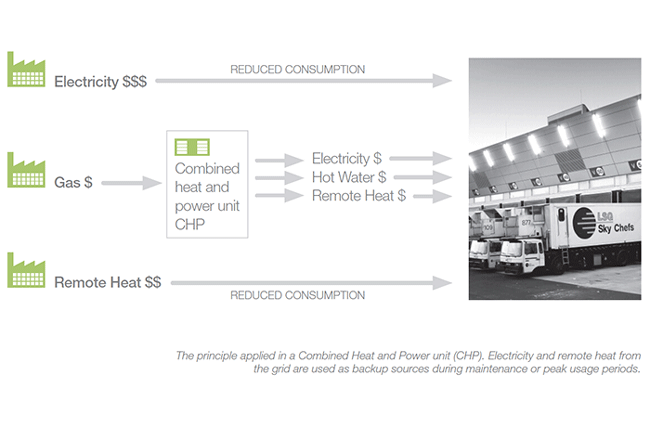Environmental Management: Producing our own Energy
Do you remember last time when the water at your house has been shut off, while you were just planning to take a shower or do the dishes? Not having any water or, even worse, any hot water for a couple of hours already poses a challenge in one’s own home. You can imagine that when this happens in a catering facility that produces more than 50,000 meals a day, the challenge is much greater!
Operating for 14 hours without water
On May 26th, the hot water system in our catering facility in Munich was deliberately completely shut off – for a total of 14 hours! A huge challenge for the team onsite, but absolutely necessary to enable the integration of our next cogeneration plant (CHP), which will supply the operation with power and heating from now on. Two independent teams consisting of our own technicians and welders, along with experts from the service provider, simultaneously welded the necessary fittings and valves in several heating pipes that were more than 20 cm thick.
The project’s biggest technical challenge was draining all the water from the widely ramified district heating system and refilling it within this ambitious timeframe of 14 hours. We are talking about a total of 6,000 liters of water with a temperature of 110°C after all. Three hours were set aside to drain the water, seven hours for the reconstruction work and the remaining time was reserved to refill the system. From a technical viewpoint, this all sounds quite logical and simple, but what impact did the lack of water have on our employees and the operations in Munich? Well, for example all of our dishwashers couldn’t operate at all, and our staff couldn’t take a hot shower after their shift – plus, the heating didn’t work. But after all, everything has worked out and our customers haven’t felt a thing – that was really great team work.
What is a CHP?
Are you actually familiar with the CHP technology? At this point I would like to provide some technical background information. Our Frankfurt facility already uses the co-generation principle for over a year now, producing both electrical and thermal energy with the use of natural gas. Natural gas is less expensive and more eco-friendly than other fossil fuels (coal or oil, for example). In addition, the thermal energy produced as a by-product during the generation of electrical power is recovered and used productively for both the heating of the building, and the heating of the water required in the dishwashing area of the unit. Also, since the energy no longer needs to be transferred and is consumed right where it is being produced, energy usage is now highly efficient.

3,000 tons less carbon dioxide
In a nutshell, a CHP produces a certain output of heat and electrical power, while requiring less input from primary energy sources. The utilization ratio of a CHP unit (output vs. input) can be as high as 80 percent, whereas average electricity plants reach a maximum ratio of 45 percent. As a result, our Frankfurt unit calculates an overall reduction of carbon dioxide emissions of approximately 3,000 tons per year, contributing significantly to the protection of the environment and climate.
Did you know that in Germany, for example, the government has diverse sponsorship programs in order to support investments in CHPs? Depending on local regulations, the government could fund CHPs with tax reimbursements or other subsidies, therefore supporting the earlier amortization of the investment.
Kind regards,
Walter
Read more about Environmental Management or our Environmental Report 2013